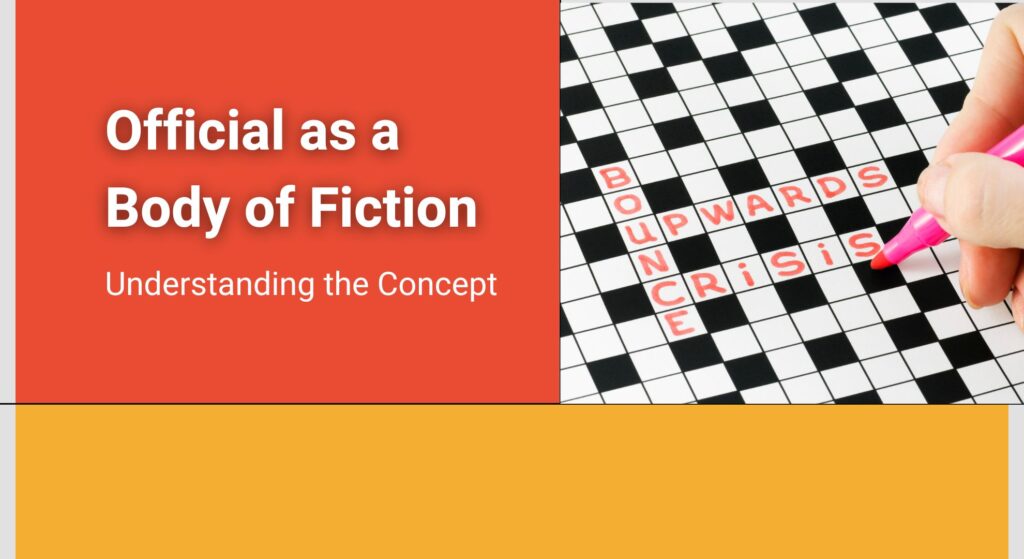The phrase “official as a body of fiction nyt” was brought to attention by The New York Times (NYT) and revolves around the idea of governments or institutions presenting narratives that might blur the line between fact and fiction. These narratives can sometimes shape public opinion, influence policies, or serve as propaganda. In today’s world, understanding how fiction can become official is crucial to critically assess information. This article explores the meaning of the term, its implications, and its significance in modern times.
How Do Fiction and Official Narratives Intersect?
Fiction and official narratives often overlap, especially when governments or organizations create stories to shape public perception. These stories might mix fact with fiction, using selected truths to create a compelling narrative that serves a particular agenda.
What Are the Characteristics of Official Fiction?
- Selective truth: Some parts of the narrative may be true, while others are exaggerated or fabricated.
- Purpose-driven: The fiction serves a goal, such as influencing public opinion or justifying certain actions.
- Emotional appeal: The narrative often appeals to emotions, making it easier for people to believe or accept the story.
By combining these elements, official fiction can become a powerful tool for those in authority.
Why Is It Important to Recognize Official Fiction?
It’s crucial to recognize official fiction because it affects how people understand events, make decisions, and form opinions. If people cannot separate fact from fiction, they may be misled, causing significant consequences for society.
What Are the Risks of Official Fiction?
- Misinformation: When people believe in false narratives, they can spread misinformation, making it harder for others to find the truth.
- Manipulation: Authorities may use fiction to manipulate people’s emotions, pushing them toward certain behaviors or beliefs.
- Erosion of trust: If the public finds out that fiction was presented as truth, it can lead to a loss of trust in institutions.
These risks highlight the importance of being critical of the information we receive, especially when it comes from official sources.
How Can We Identify Official Fiction?
Identifying official fiction requires careful analysis of the information being presented. People must ask critical questions, such as:
- Who is presenting the information?
- What is the purpose behind the narrative?
- Are there independent sources that confirm the story?
By questioning the source and looking for inconsistencies, we can better separate fact from fiction.
What Are the Tools for Analyzing Official Narratives?
- Fact-checking: Using independent fact-checking websites or organizations to verify the accuracy of the information.
- Cross-referencing sources: Checking if other credible sources present the same information.
- Critical thinking: Analyzing the motivation behind the story and whether it serves an agenda.
These tools can help in recognizing when a story is more fiction than fact.
What Are Examples of Official Fiction in History?
Throughout history, many governments and institutions have used official fiction to push certain agendas. Some famous examples include:
- Propaganda during wars: Governments often create narratives to boost morale or demonize the enemy.
- Political campaigns: Candidates might use fictional or exaggerated claims to sway voters in their favor.
- Economic myths: Sometimes, governments present a rosier picture of the economy to calm the public or encourage investment.
These examples show how official fiction has been used to influence populations on a large scale.
What Role Does the Media Play in Official Fiction?
The media plays a significant role in either spreading or challenging official fiction. When journalists fail to fact-check or provide balanced perspectives, they can unintentionally become part of the problem.
How Can the Media Prevent Official Fiction?
- Investigative journalism: Reporters should dig deeper into stories to uncover the truth, rather than accepting official narratives at face value.
- Balanced reporting: Presenting multiple viewpoints ensures that readers get a fuller picture of the issue.
- Holding authorities accountable: Journalists must ask tough questions and demand transparency from those in power.
A responsible media can be a crucial defense against official fiction.
How Does Official Fiction Impact Society?
Official fiction can have both short-term and long-term effects on society. In the short term, it may influence public opinion and behavior. In the long term, it can shape culture, history, and how future generations understand the past.
What Are the Long-term Consequences of Official Fiction?
- Distorted history: When fiction becomes accepted as fact, it can change how future generations view historical events.
- Cultural impact: Official fiction can shape cultural narratives, sometimes leading to deep-rooted biases or misconceptions.
- Social division: When people believe different versions of the same event, it can lead to division and conflict within society.
These consequences show the lasting impact that official fiction can have on how we understand the world.
Pros and Cons of Recognizing Official Fiction
| Pros of Recognizing Official Fiction | Cons of Official Fiction |
|---|---|
| Informed decision-making | Spread of misinformation |
| Better critical thinking | Manipulation of emotions |
| Accountability for authorities | Erosion of public trust |
| Stronger media integrity | Divisive narratives |
Understanding official fiction helps individuals become more informed and critical thinkers, while the cons highlight the negative impact fiction can have when it is accepted as truth.
The concept of “official as a body of fiction” sheds light on how governments, institutions, and the media may present fictionalized narratives as truth. Recognizing and questioning these narratives is essential to prevent misinformation, manipulation, and distrust. In today’s information age, critical thinking and media literacy are more important than ever to distinguish between fact and fiction.
By staying informed and questioning official stories, we can better understand the truth and avoid falling victim to narratives that serve hidden agendas.



